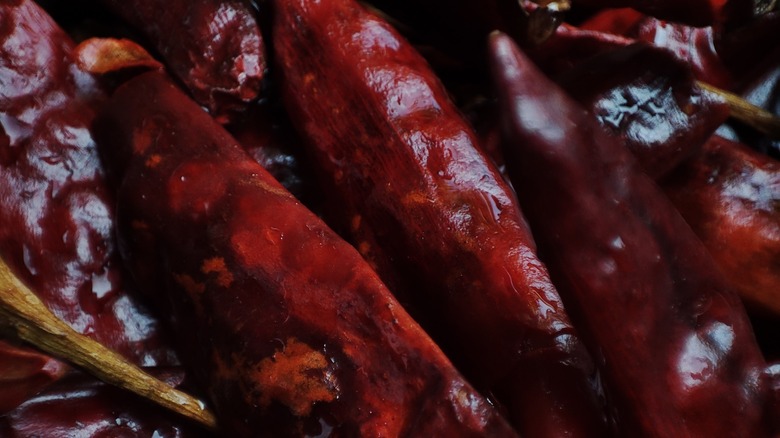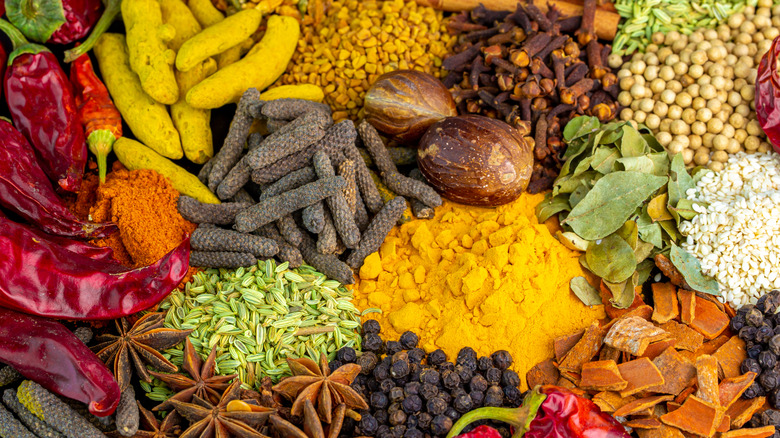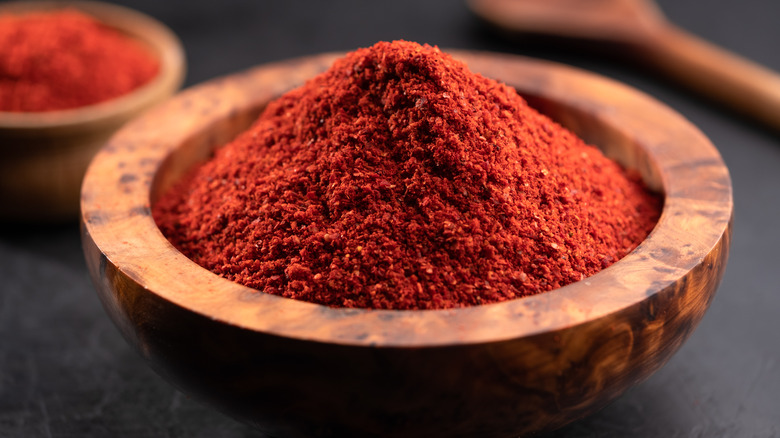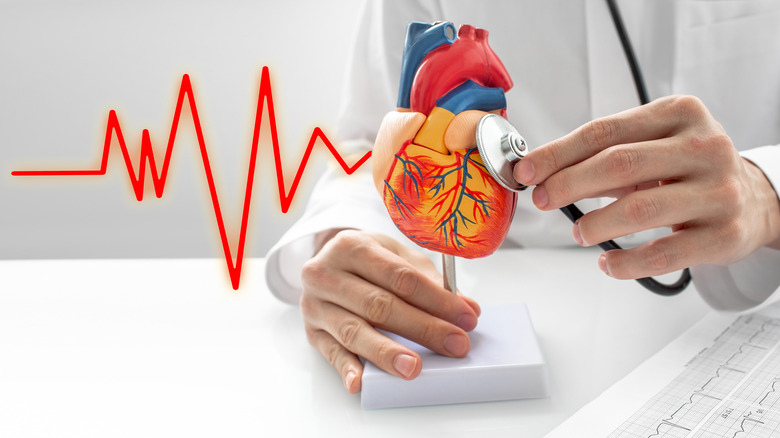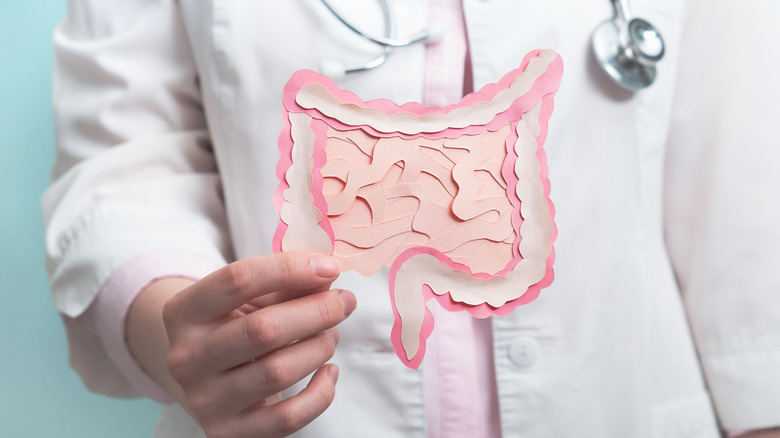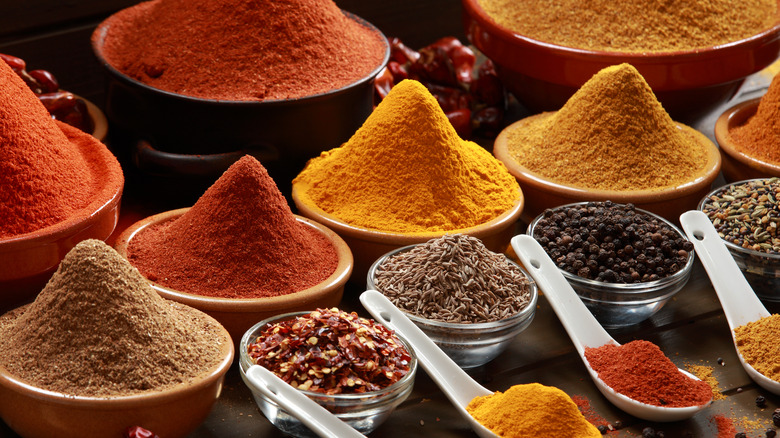What Really Happens To Your Body When You Eat Spicy Food Daily
May 11, 2022For a lot of people, few sensations hit the spot like a bit of spice. Whether it's the mouth-numbing feeling of Sichuan pepper, the nasal burn of wasabi or horseradish, the fiery heat of chiles, or the mind-blowing complexities of your favorite spice blend, spices can elevate even the most humdrum of dishes. And for heat lovers, few things taste better.
That hot, potentially uncomfortable (depending on your tolerance levels) sensation you get after eating food is caused primarily by the presence of capsaicin, a chemical compound that activates the pain receptors in our mouth (per Medical News Today). And the effects of eating something that's technically an irritant have long interested doctors and nutritionists alike. "Spicy food is a hot topic in nutrition — no pun intended," says registered dietitian Patricia Bridget Lane to the Cleveland Clinic. We can understand why. Surely something that causes that much of a reaction for our taste buds must be doing other stuff elsewhere, right?
Well, as it turns out, spicy food does have some pretty interesting effects on our bodies — and we're going to lay them all out for you. Grab a glass of milk, and let's take a look at what spicy food does to your body.
It could help you live longer
Have you ever felt particularly brave when ordering a dish at a high spice level, only to feel like that curry or hot sauce in front of you might literally end your life? We feel you. We've been there.
But the good news is, spicy food is more likely to extend your life than to shorten it, especially if you consume it every day. This is according to a large-scale Chinese study (via The BMJ) that looked at over half a million people's eating habits over nine years. The authors were interested in expanding on the research already done about capsaicin and its effects on the body, and looked at spicy food's effects on mortality. They found that individuals who ate spicy food almost daily had a roughly 14% lower risk of death overall. They were also less likely to die from specific causes (like respiratory diseases or cancer) than those who ate spicy food less than once weekly.
That said, the authors of the study were quick to point out that this doesn't necessarily mean that spicy foods cause you to have a lower mortality risk, or that eating more spicy food may come hand in hand with a healthier diet and lifestyle. Still, capsaicin's already-established positive effects on chronic diseases may make it a good daily addition to your diet.
It could boost your metabolism
Anyone who's gone for the hottest thing on the menu before will know the physical effects of spicy food: Sweat pouring, eyes watering, heart pounding, gasping for air. But other physical consequences may not be as unpleasant.
One interesting effect that spicy food has is on your metabolism, the process by which the body converts food into energy (per the Mayo Clinic). A study published in the Proceedings of the Society for Experimental Biology and Medicine, conducted on rats, found that eating foods higher in capsaicin can speed up the body's metabolic action. In the same study, it was also observed that the rats eating foods higher in capsaicin had decreased fat levels.
Bear in mind, too, that you may not have to be eating the hottest foods under the sun to see this effect. Milder-tasting spices, like cumin and turmeric, also contain capsaicin, says registered dietitian Bonnie Taub-Dix (via Women's Health Magazine). Before you rush out and stock up your chili drawer, though, it's important to note that although a faster metabolism has been associated with increased weight loss, that doesn't mean that spicy food will cancel out everything else in your diet and lifestyle. "I wouldn't rely on it as a weight loss method," advises Taub-Dix.
It may give you digestive trouble
It's no secret that spicy food can make you a little uncomfortable. But that discomfort doesn't just happen when you're eating it. Consuming spicy food every day can lead to — or exacerbate — a host of digestive issues.
After eating spicy substances, the capsaicin that causes the sting in your mouth can also end up irritating the lining of your esophagus and gastrointestinal tract (per Healthline). This can cause or contribute to acid reflux, where stomach acid comes back up into your tract, causing discomfort and pain.
Spicy food's effects on your body's musculature can also make acid reflux worse. "Spicy foods can cause the small round muscle that separates your esophagus from your stomach pouch to become slack and remain open when it should be closed. This can lead to reflux in the upper GI tract," says the Institute of Culinary Education's director of nutrition Celine Beitchman (via Eat This, Not That!). And if you have other conditions that affect digestion such as irritable bowel syndrome, eating spicy foods regularly could cause symptoms of these to get worse, Beitchman says.
It can help reduce inflammation
When we think of inflammation, we tend to think of swollen, knocked knees or puffy eyes after a sad movie (or hot curry). But inflammation can occur in all of the cells, affecting the body on a barely visible level. And over time, chronic inflammation can contribute to a host of long-term diseases (per the Cleveland Clinic).
While many lifestyle factors can lead to increased inflammation in the body, our diets and lifestyles may also reduce inflammation. Eating spicy food daily may do the latter, according to research published in the Journal of Translational Medicine. Looking at a wide range of studies, the researchers concluded that spicy substances may alter inflammation for the better, particularly when it comes to chronic diseases. Although the authors of the research did note that more studies need to be conducted to properly ascertain the effect of spicy foods on inflammation related to chronic conditions, they stated that "spices and their active components hold a huge guarantee for the development of affordable, novel and safe drugs against chronic diseases."
It may make it harder to sleep
If you have trouble dropping off at night, you might want to reconsider your spice levels. Although poor sleep is more commonly associated on a dietary level with things like caffeine or alcohol, eating spicy food regularly may also contribute to a rougher night's rest.
The first way that it could do this is by raising your body temperature, discusses a study published in the International Journal of Psychophysiology. The study looked at the effects of eating mustard and tabasco sauce with an evening meal in a small group of young men. It found that the participants were awake more in the night, took longer to get to sleep, and had poorer sleep overall, potentially due to a higher overall temperature.
And that's not the only way that spicy food can disrupt your zzz's. When you eat spicy food, the capsaicin can stimulate and irritate your digestive tract, producing heartburn or making acid reflux worse, says Healthline. This can get even worse when you're lying down trying to sleep, as your body position means that stomach acid can come back up into your upper GI tract more easily. As a result, your efforts to sleep may become way more uncomfortable.
It may help your heart health
Taking good care of our hearts is one of the keys to good health, and most things we do on a day-to-day basis can affect them. That includes the things we choose to eat, and so spicy food lovers may rejoice at this next bit: Eating spicy food regularly could affect your cardiovascular health for the better.
"Cultures that eat spicier foods have been shown to have fewer occurrences of cardiovascular diseases such as strokes and heart attacks," states board-certified nutritional coach Dr. Carrie Lam to Eat This, Not That!. The capsaicin in foods that are favored by said cultures reduce inflammation throughout the body and can bring cholesterol levels down, both of which have a potent positive impact on your heart.
Capsaicin can also impact your artery width by blocking a specific gene that causes your arteries to narrow, thereby keeping blood flow healthy and abundant. "With the blood vessels dilating, blood pressure can be lowered and help prevent blood clots. The heat the body produces from eating spicy foods also increases blood flow," says Lam. That's reason enough for us to add a few extra chilies to any evening meal!
It may alter how much you crave other foods
We all know what it's like to crave a certain food. But what's super interesting is that the foods that we eat end up affecting our cravings for other things. And when one eats spicy food every day, this effect is particularly noticeable.
A study published in Food Quality and Preference found that adding cayenne pepper to a bowl of soup consumed by participants made salty foods less desirable for them, while increasing their desire for sugary or fattier foods. Participants also noticed a few other effects after consuming the cayenne, like having more energy and feeling less hungry.
However, although spice seems to affect cravings, it may not be the same case for everyone. Another study published in the British Journal of Nutrition examined the impact of eating red pepper, again in soup. This study established that the participants who ate the red pepper subsequently ate way less fat than those who didn't, implying a reduction in both their cravings for fattier foods and how much food they ate overall.
Daily spicy food may lead to a healthier gut
The term "microbiome" is tossed around a lot in the nutrition world, as well as its impact on health. But it can be easy to forget what the microbiome actually is.
Our gut microbiomes are essentially enormous communities of bacteria, fungi, and parasites that live in our bellies, and have such an impact on our bodies' everyday function that they're considered a supporting organ (per the Harvard T.H. Chan School of Public Health). Among the gut microbiome's contributions to our wellbeing are its positive effects on the immune system, increased ability to break down food effectively, and the healthy use and delivery of vitamins that we ingest.
Our gut microbiome is affected heavily by what we eat, and spicy food can keep it in good standing order thanks to the capsaicin in them. "Capsaicin can stimulate a healthy gut flora and have a positive effect on the gastrointestinal tract," says registered dietitian Patricia Bridget Lane via the Cleveland Clinic. Among the bacteria that capsaicin helps to increase are Faecalibacterium prausnitzii and Roseburia, which are not only vital to allow the microbiome to stay balanced, but also aid in metabolic regulation, according to research published in Molecules.
It may cause you to have looser stools
Okay, it's time to address the elephant in the room. If you've ever been caught off-guard by the heat level of a dish, you'll also probably know the feeling of some very ... specific after-effects in the bathroom a few hours later.
Unfortunately, eating regular spicy foods can contribute to an increased likelihood of loose stools and diarrhea, according to Verywell Health. When you eat foods containing capsaicin, they can end up irritating your gut, stomach lining, and intestines. This irritation is perceived by your body as an attack on its homeostasis, and the small intestine then reacts by moving food through your system faster, leading to diarrhea. And to add insult to injury, when the food is exiting your body, the capsaicin can then end up irritating your anus, causing even more pain.
Fun, right? Although eating spicy food doesn't end up in diarrhea for everyone, for those with more sensitive stomachs, eating it daily may result in increased trips to the bathroom. Limiting spicy food is of course an option to prevent this, but it's also advisable to eat spicy foods with dairy or something sweet, as these can reduce the spice sensations and make it less irritating.
It may decrease your appetite overall
You may have an insatiable appetite for spice, but after eating it, your appetite for other things may be slightly reduced. This is due to spicy food's potential effects on your overall desire to eat, which may be reduced as you consume more of the hot stuff.
"People who eat a diet rich in spicy foods tend to eat less food overall throughout the day," states registered dietitian Patricia Bridget Lane (via the Cleveland Clinic). This assertion is clearly seen in a study published in the British Journal of Nutrition, which looked at the effects of eating red pepper on dietary habits. It was found that adding red pepper to food resulted in participants feeling less hungry and eating less afterward.
So why are we less hungry after eating spicy food? It all starts in the brain, folks. "There's some research that capsaicin acts on the hypothalamus — the part of the brain that controls hunger and fullness," says Lane. The study published in the British Journal of Nutrition also discussed the activation of the sympathetic nervous system (which is controlled by the hypothalamus, and which regulates the flow of hormones to manage the stress response and hunger levels) when eating spicy foods (per Harvard Health Publishing).
It may decrease your risk of ulcers
Peptic ulcers are no joke. Sores that open up in the lining of your stomach or small intestine, peptic ulcers can cause a range of unpleasant symptoms, including pain, nausea, and heartburn, as well as vomiting or weight loss, says the Mayo Clinic. But while you might assume that spicy foods are the greatest enemy of ulcers, it may not be as harmful as you think.
Although spicy foods can make pre-existing ulcers more painful, they don't actually cause them in the first place. In fact, regular consumption of spicy food may help you avoid them in the first place, according to University of Chicago Medicine. This is because capsaicin actually slows the production of stomach acid, creating a more alkali environment and helping to reduce ulcer risk, per research published in Critical Reviews in Food Science and Nutrition.
It's for this reason that capsaicin has been considered for its medicinal benefit for controlling ulcers. Ulcers are far more likely to be caused by the presence of the bacteria H. Pylori, or taking NSAIDs like ibuprofen too frequently.
It may improve your mood
Have you ever left a restaurant where you've just boldly eaten the spiciest thing on the menu with a spring in your step? There may be more to that than just you enjoying the taste of the food (or feeling proud of yourself for surviving the experience).
Eating spicy food can actually cause a lift in mood, according to registered dietitian Bonnie Taub-Dix (via Women's Health Magazine). This occurs because the spice prompts the brain to release serotonin, a hormone that acts as a mood booster that makes us feel better while affecting memory, sleep, stress, and other behaviors and functions (per Harvard Health Publishing).
Having sufficient serotonin in the brain and body is also a key factor in treating depression. But while spicy food may help to increase serotonin production, eating it more regularly shouldn't be considered a course of treatment for depression or any other mental health conditions, advises Taub-Dix. Instead, support and treatment should be sought out and followed from a healthcare professional.
It may help improve cholesterol levels
Your cholesterol levels are a huge determining factor in cardiovascular health, and high cholesterol can increase your risk of developing heart disease (per the Mayo Clinic). Doing what you can to try and keep cholesterol levels healthy is therefore a wise choice for your health, and eating spicy food regularly may do just that. A study published in the European Journal of Nutrition found that hamsters that were fed a high-fat diet showed reduced cholesterol levels when eating a higher amount of capsaicin than hamsters who were fed none.
Despite the positive effect that spicy food seems to have on cholesterol levels, however, the study authors warn against making drastic "hot" changes to anyone's diet. "[W]e certainly do not recommend that people start consuming chilies to an excess," states study author Zhen-Yu Chen (via Science Daily). "A good diet is a matter of balance. And remember, chilies are no substitute for the prescription medications proven to be beneficial." Chen did say, though, that they could be useful as a supplement to your diet — especially if you're craving the spice.

